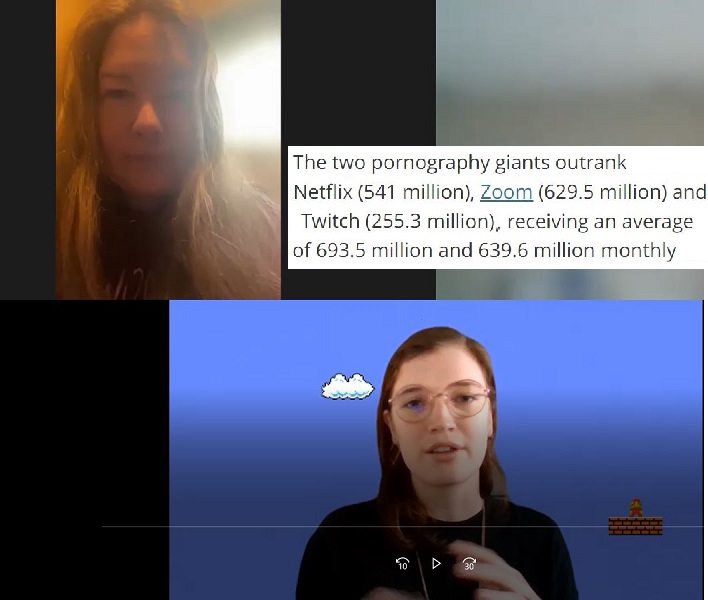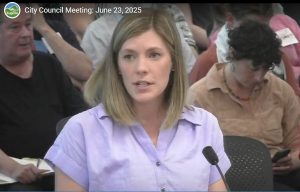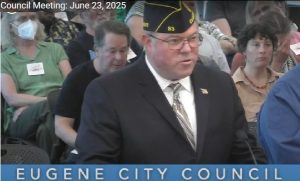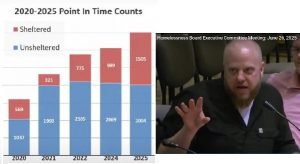Faith leaders on the front lines: Unintended consequences of the Internet
8 min read
Sarah Koski talks with Heidi Bloodgood about the challenges of Internet pornography for youth, and its effects in the context of communities of faith.
Talking with faith leaders on the front lines, Sarah Koski.
[00:00:03] Sarah Koski: Good morning. Introducing Heidi Bloodgood, former Chamber of Commerce staffer. You’ve done so much in Eugene, Oregon when it comes to early child development, theater, creative arts, and now you’re in Boston right now in Harvard. So can you tell me a little bit about the things that you’re studying right now?
[00:00:23] Heidi Bloodgood: Thank you for having me here today. This is all such an honor. I am now looking at, How do we protect children and adolescents online as they navigate their smartphones or their iPads or their laptops? There’s just a lot that an adult can access on the Internet and sometimes we forget that children, unless they have better protection, can also access those things. And so I’m looking at, How do we have those conversations? How do we inform parents? How do we approach these topics with humility? Because it’s not affecting everybody equally, how do we come to the table and say, this is what’s happening and how do we protect them?
[00:01:06] But then, after a child is exposed to content that might be a little bit more adult, how do we help them reframe it? How do we help them navigate it? How do we help them return to that childlike innocence, which is just so important for children to maintain, or at least that’s what I believe.
Thank you for supporting
local citizen journalism
[00:01:23] Sarah Koski: It’s scary to talk about children’s access to pornography. And it’s really scary to talk about, Hey, there’s some really deep, dark things out there. And okay, you know, it’s an adult’s choice whether or not they want to partake, but what really happens is my child sees that.
[00:01:40] Heidi Bloodgood: I think when it comes to approaching topics with your children, what’s important to keep in mind about Generation Z that is unique to our generation is that chances are, we’ve already seen the dirty. And studies show that the average age of exposure is around the age of 10. And we might not be able to understand it. We can’t contextualize it. It’s new. It doesn’t make sense, but we’ve seen it and it’s out there and it’s, it’s in YouTube recommendation videos that maybe we didn’t click on. It’s in advertisements on websites that we visit. It’s—you can see sexual undertones on social media, you can see it in gaming, it’s everywhere. And so my first recommendation to parents is to approach it without a shame base, because the likelihood that a child is going to view pornography or see some sort of sexually explicit content on accident is pretty high.
[00:02:35] And so I think parents that are equipped to understand this probably is going to happen and it’s not their fault, that can already start to take away some of the shame, especially as younger Christians that are trying to learn their faith and what that means for them.
[00:02:51] I also think here’s an important question that parents should keep in mind. When I was in middle school, because we had access to devices so early and parents didn’t quite understand how much we could find, there was a moment when a lot of my friends and I in middle school saw pornography all kind of at the same time, it just hit us like a wave. And we didn’t know who to talk to. We didn’t know if we could open up to youth leaders. We didn’t know if we were in trouble. We didn’t know if this was going to be something that was going to get our phones taken away or something like that. So most of us ended up, keeping kind of quiet.
[00:03:24] And one interesting question that I, as an adult, have been really trying to figure out how to respond to is, if I see pornography when I’m 13, or if I see pornography when I’m 14, am I still a virgin? And for those outside of the Christian context, maybe that question doesn’t carry as much weight, but when you’re in a Christian context, that question is everywhere and an Internet makes it really difficult to navigate those types of questions.
[00:03:53] As a teenager, when you go to youth group and everyone’s talking about purity and how to ‘stay pure for Christ and give the best gift that you can to your future spouse,’ that can be really difficult to navigate when there’s also the sub-under-course of Internet culture.
[00:04:11] And so I think parents have an opportunity to educate themselves.
[00:04:15] There’s really good resources out there. I’m doing my best to try and contextualize it in my own journey, but it’s hard. The Bible doesn’t directly talk about porn, and so it is hard to look at the Bible and think, what does this mean for the Internet? And we are for the first time in history having to ask these questions. And so if a parent’s feeling overwhelmed, there’s resources, but we’re all here together. And I think supporting each other, having honest conversations at age appropriate with our children and with each other sooner versus later, I think will better prepare and equip our children for the next decades to come.
[00:04:56] Sarah Koski: Thank you for that. That’s an amazing response. And as you’re growing in your education at Harvard, you’re talking to these Harvard professors and they’re like, ‘Man, we really need this studied.’ And you’re on the forefront of a lot of things.
[00:05:11] Heidi Bloodgood: First of all, the Internet is global and that’s unique. We’ve never had so much access to everyone at the same time. Chances are a lot of families are going to be dealing with these issues if they have access to technology and it’s going to vary across culture and response is going to vary across culture. But for the first time, It’s almost like the entire planet is trying to figure out this issue all at once. And fortunately, I’m so blessed to work in a school where there’s an international community. And so as I ask more international friends, how does this look in your culture? How does this translate in your country? I’m noticing very, very similar issues. And so we have an opportunity as a global group to look at, what’s happening and you finding these really similar through lines.
[00:06:02] Studying human development, specifically child and adolescent development, what we notice is that there are key times in your brain development, where you’re building tools that are going to impact you for the rest of your adult life. And a lot of those neural changes happen around the age of puberty, some of them before, some afterwards, But children who have access to devices at an early age are actually having difficulties in adulthood because of the access at an early age, which is unique to other generations who got digital access in their adult years when their brains were more fully developed.
[00:06:38] So it’s not just by coincidence that maybe your 16-year-old kid is addicted to their phones. You get frustrated and say, ‘Put your phone down. I’m talking to you.’ But it turns out things are a lot more complex than that. That’s not just them being stubborn, it’s not just them being obstinate, there are real addictions, there are real neural circuits that are forming that are dependent upon technology.
[00:07:01] And I think it’s going to require older generations to have a sincere compassion and grace for younger generations, because they aren’t going to experience the same levels of addiction to devices or interpretations of interacting with devices at the same rate. And it’s going to take a lot of patience and it’s going to take a lot more research to really understand the long-term effects.
[00:07:23] Sarah Koski: Wow. It’s just mind blowing how fast the rate of information and content is getting brought to us and how we have to extrapolate what’s good, what’s moral, what’s ethical. How do I communicate what I see? And I mean, there’s just absolutely fascinating the work you’re doing. And for you, you have faith, how is faith playing a role in the things that you’re learning and the trajectory of your career path?
[00:07:49] Heidi Bloodgood: It’s easy to get overwhelmed. Adolescent exposure to pornography, child pornography rates of distribution have increased, more children are being involved in things like sexting or cyber bullying, there are just so many dangerous, potential, dangerous, potential pitfalls in the internet.
[00:08:08] But I remember in my faith that God is a God of justice. God is a God of truth and He can help break these either addictive cycles or dark pits of the Internet that are just full of ugly things. And it’s comforting because God cares for the children and He cares for the lost sheep and He will leave the 99 to go after the one. And that’s what gives me comfort to know, that the responsibility of facing this issue isn’t on my shoulders alone and it’s not on one single government shoulders alone, and it’s not in one single entity or one single politician. I have to trust that He’s there where I’m headed and He’s been where I’ve been and He gets so have going through right now.
[00:08:49] And I can just lean into that because the Internet is a huge place (laughs). It’s a big, vast, ethereal unknown code of numbers boiling around through tubes and wires. And it’s like, God gets it way more than I do. And He’s gonna be there for, you know, those of us who are trying to do what we can.
[00:09:11] Sarah Koski: Heidi, you are brilliant, I’m so proud of you. You are just an inspiration and I’m so proud of all the work so much for being a faith leader on the front lines and here’s to your future.



